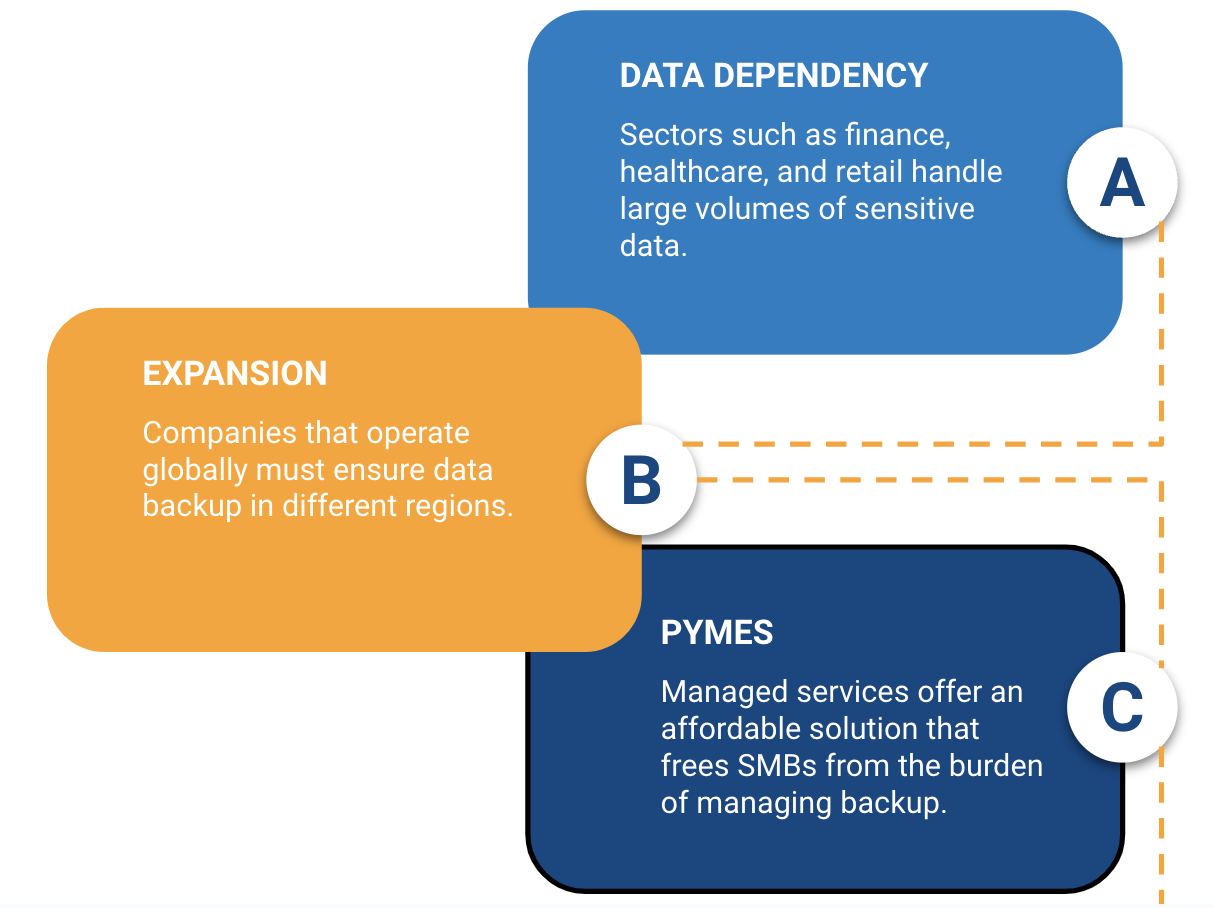
Data backup is a strategic priority for businesses, especially in an increasingly complex and vulnerable digital environment. However, maintaining and managing a robust backup system can be costly and demanding in terms of resources and expertise.
This is where managed data backup services offer a comprehensive solution, allowing businesses to protect their information without burdening their own teams.
What are managed data backup services?
Managed data backup services involve delegating the responsibility of protecting and storing a company's critical information to an external provider. This provider manages all backup activities, including planning, implementing, monitoring, and recovering data in the event of loss or failure.
Benefits of managed data backup services
Reduced operational costs
Managing data backups internally requires investment in infrastructure, specialized software, and trained personnel. Managed services reduce these costs by offering a solution that includes everything needed at a predictable and often lower cost compared to the initial investment in equipment and software.
Scalability to match business growth
As businesses grow, their storage and backup needs increase. Managed services offer the flexibility to expand storage quickly and efficiently without significant disruption or additional costs, ensuring that backup infrastructure remains aligned with business growth.
Access to advanced technology and tools
Managed services companies invest in cutting-edge technologies and advanced backup tools, allowing their clients to benefit from high levels of security, fast recovery, and cloud or hybrid storage options.

Security and compliance
These managed services are often aligned with international regulations, such as GDPR or ISO, and apply advanced encryption and authentication measures to protect data in transit and at rest. This ensures that information is secure and that the company complies with regulations relevant to its industry.
24/7 monitoring and support
Managed service companies offer continuous monitoring, meaning that any failures in backups are detected and addressed immediately. This minimizes downtime and ensures that backups are always up to date and ready for recovery.
Managed Data Backup Services Use Cases
Data-intensive businesses
Industries such as finance, healthcare, and retail handle large volumes of sensitive data that must always be available and protected. A managed backup system ensures business continuity by enabling fast and efficient recovery from any failure.
Expanding businesses
Companies that operate globally must ensure data backup across different regions and comply with local data protection regulations. Managed services allow these efforts to be coordinated and ensure worldwide backup without interruptions.
SMEs with limited resources
For small and medium-sized businesses, having an internal IT team dedicated to backup can be unfeasible. Managed services offer an affordable solution that frees SMEs from the burden of managing backup, allowing them to focus on their core business.

Best Practices in Managed Data Backup Services
- Custom Backup Strategy
It is crucial that the managed service provider works with the company to design a strategy that fits its specific needs, including the frequency of backups, the type of storage, and the retention time of the data.
- Periodic Recovery Testing
It is not enough to just store the data; it is essential to do periodic recovery testing to ensure that the data can be restored quickly and completely. Managed services offer this feature as part of their monitoring, regularly validating the integrity of the backups.
- Incident Response Plan
Having a detailed response plan ensures that the company knows exactly what to do in the event of data loss. A managed service provider should provide support in creating this plan and ensure that all steps to recover the data are clear and accessible.
- Focus on Regulatory Compliance
It is important to work with a provider that has experience in regulatory compliance, especially if the company handles customer data. This facilitates audits and ensures that the company is aligned with data protection regulations.

Factors to Consider When Choosing a Managed Data Backup Services Provider
- Vendor Reliability and Experience
Researching the vendor's track record, as well as security and backup certifications, can give a clear idea of their ability to securely manage data.
- Service Flexibility and Scalability
Verify that the vendor can adapt to changing backup and storage needs as the business grows or changes strategy.
- Cloud, On-Premises, or Hybrid Storage Options
The ability to choose between cloud, on-premises, or a hybrid combination of storage allows the business to maintain control over where and how its data is stored.
- Cost and Billing Model
Managed services typically offer monthly or annual payment options. Ensuring the billing model is aligned with the business's budget and needs is crucial.
A Comprehensive Solution for Business Data Protection
Data backup using managed services allows businesses to stay secure and compliant without overburdening their internal team. With access to advanced technology, scalability, and ongoing support, these services are an investment that not only protects information, but also strengthens business continuity.


